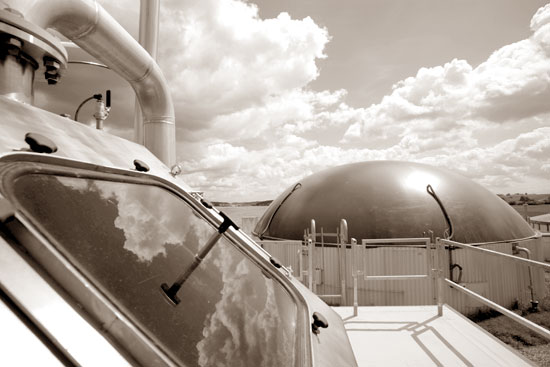Multi-pronged approach to biogas technology
Biogas as a triple benefit option for Sri Lanka:
By Indeewara Thilakarathne
[email protected]
The inaugural session of the Lanka Biogas Association was held last
Thursday with the launch of its official website (www.lankabiogas.org).
Although one may argue that it is another organization added to the
plethora of alternative-energy organizations in the county, Lanka Biogas
Association, among other things, will bring biogas practitioners
scattered across the country under an umbrella.
 It also provides much “needed organizational framework which would
connect Sri Lankan biogas practitioners with their counterparts in the
region and with international organization engaged in the application of
biogas technology in solid waste management and acidic waste water
treatment while generating energy and highly fertiled organic manure as
a by-product of the process. It also provides much “needed organizational framework which would
connect Sri Lankan biogas practitioners with their counterparts in the
region and with international organization engaged in the application of
biogas technology in solid waste management and acidic waste water
treatment while generating energy and highly fertiled organic manure as
a by-product of the process.
With the advancement of biogas technology, biogas can be produced
from wide range of materials such as from biomass, waste water and solid
waste.
It is currently estimated that entire electricity requirement of the
country can even be met by efficient application of biogas technology.
Indigenous technology
Although the early use of biogas in Sri Lanka was marked by the
adaptation of foreign technology for the construction of bio-digesters
like those of Chinese and Indian models, subsequently Sri Lankan
scientists were able to invent the Sri Lankan Dry Batch Biogas System.
In terms of efficiency, it has proved that as effective as Chinese and
Indian models and won an international award.
By now, through the continuo training programmes, Sri Lanka has
produced considerable body of biogas practitioners as well as biogas
service providers such as masons who are specialized in the construction
of biogas plants. The technology has been effectively used in major
scale production of biogas solving seemingly intractable issues such as
solid waste management and acidic water treatment.
For instance, Kirulapona Market Garbage Digestion Project and
large-scale biogas plants set up at Muthurajawela demonstrate in no
uncertain terms the multiple benefits accrued from the application of
biogas technology.
Polonnaruwa Garbage disposal project which is to be commissioned
soon, bears testimony to application of advanced biogas technology in
solid waste management. It has been pointed out that garbage dump in
Polonnaruwa in addition to polluting the environment, has posed a
serious threat to diminishing elephant population.
Elephants used to eat toxic garbage and the issue was taken up by
environmentalists and animal lovers around the world. The plant will
solve the garbage problem in the area, producing rich bio-fertilizer.
Biogas technology has also been used in waste water treatment. Waste
water is produced by factories and coconut mills and distilleries. These
waste water has higher degree of acidity and pollutants which will, in
the long run, pollutes surface as well as ground water.
Waste Water treatments plants set up at distilleries, farms and
hotels proved that in addition to effectively treating the waste water,
biogas produced can be used for thermal purposes.
For instance, biogas can be used to heat up boilers and for cooking
and generating electricity. Technology has been applied in Maxis Farm in
Seeduwa and Waste Water treatment plant at Air Link Hotel in Seeduwa.
Against the rising cost of petroleum products such as LP gas which
has now been used widely in diverse parts of the country for domestic
and industrial purposes, cost effective innovative solution to rising
fuel bill is to apply biogas technology at domestic level.
Biogas produced from waste generated in household is sufficient for
cooking purposes and bio-fertilizer which is a by product of the
process, can be used for home gardening. Technical assistant for the
construction of such domestic plants can be obtained from National
Engineering Research and Development (NERD) Centre of Sri Lanka.
Apart from using fossil fuel for transportation, LP gas which is a by
product of crude oil refinery, has been widely used for cooking in Sri
Lankan households. Since the staple in Sri Lanka is rice, rice cooking
will consume considerable energy irrespective of whether the household
use LT gas or electricity for cooking.
NERD has come out with an innovative solution to this much energy
consuming exercise, with biomass rice cooker. The biomass rice cooker is
designed to cook 1kg of rice, at a time, using a shell of a one coconut
which is usually discarded or under-utilized by any coconut consuming
family in Sri Lanka .
The biomass rice cooker which is, at present, available in market,
can also used to boil up to three liters of water and keep cooked food
warm for seven hours without adding any more fuel. Rice can be cooked in
45 minutes.
As advanced technology has been used in the production of the cooker,
the Rice pan will not gather any shoot as usual in cooking with
firewood. A host of benefits can be accrued from the application of
advanced biotechnology in solid waste management, solid water treatment
and in generation electricity for out-of the grid villages.
At present, rural electrification projects using biomass have been
effectively implemented in several out-of-the grid villages. Another
potential area of using biotechnology is to harness biodiesel from not
edible seeds and plants which can be directly used for vehicles without
causing any damages to mechanical parts.
The need of the hour is to adapt a national policy on Energy which
will explore the imminence potentials of using biogas technology for
economic development.
Corner stone of such a policy is to recognize science and technology
as the engine of economic growth. |
